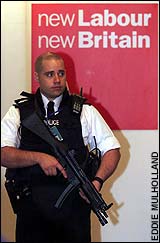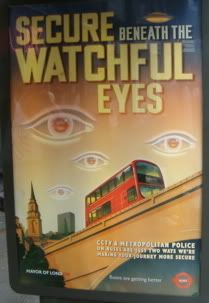Better Late than Never.
But still about 20 30 years too late: The UK Countryside Alliance organizes the First-ever National Shooting Week.
The first-ever National Shooting Week was launched on Monday 21st May at the National Shooting Centre at Bisley, known as ‘the home of shooting’.
From Saturday May 26th to Sunday June 3rd, thousands of people across the UK will try one of the most exciting Olympic sports during National Shooting Week.
Shooting schools and clubs are putting on more than 200 open days across the country so the public can try shooting for the first time.
I will be fascinated to see what the turnout for this looks like.
(via Uncle.)
UPDATE, 5/28:
Minister urges teenagers to take up shooting
(UK Telegraph, 5/27/07)
Anti-gun campaigners have accused the Government of making a U-turn on firearms after a minister urged teenagers to take up shooting to improve their behaviour.Richard Caborn, the sports minister, has backed a drive by shooting groups to increase participation in the sport among children as young as 12. He believes that the sport helps young people to become more responsible and disciplined, and vowed that significant funds would be made available to help boost participation.
I’ll believe that when I see it.
Handguns were banned in Britain in 1996 following the Dunblane massacre, in which 16 children and their teacher were killed at a primary school.
Previously, the Government has taken steps to crack down on shooting by increasing the age limit for buying air weapons, as well as banning handguns.
After five gun murders in February in London alone, Tony Blair warned that 17-year-olds could face mandatory five-year sentences for possessing illegal guns.
What? The ASBOs are proving ineffective?
“We want to boost the number of people who take part in shooting sports, particularly among young adults,” Mr Caborn told The Sunday Telegraph. “We are investing £600 million in developing medal winners for 2012 and shooting will benefit greatly from that.”
Schools have been encouraged to increase the involvement of young people in shooting sports and Mr Caborn welcomed the first National Shooting Week, which begins this weekend, as a good way to raise levels of participation.
Though according to the first commenter to this post, none of that £600 million apparently went towards advertising National Shooting Week.
He has already upset the anti-gun lobby by supporting moves to relax the ban on handguns in the hope of boosting Britain’s chances of winning pistol-shooting medals at the 2012 London Olympics. Lending his support to the week-long campaign has raised its fears further. However, a Labour Party document, for which he wrote the foreword, argues that there is a need to work with shooting organisations to develop ways “to demystify firearms”.
How did this guy end up as a minister in Britain’s government?
The party has published a Charter for Shooting, which it released after promising in the 2005 general election to ensure that country sports would be protected.
In the charter, it says that Labour is fully supportive of shooting organisations. -“Government ministers have noted the benefits of introducing young people to the sport in terms of developing habits of safety, self-discipline and responsibility,” it says.
However, Gill Marshall-Andrews, the chairman of the Gun Control Network, said that she was alarmed by Mr Caborn’s backing for National Shooting Week, which aims to introduce people to shooting for the first time and improve people’s understanding of guns.
“The Government should be ashamed of itself for putting its energies into encouraging people to take up shooting when we should be ensuring that there are fewer and fewer guns available,” she said. “By backing this initiative they’re sending out the wrong message.”
Ms. Marshall-Andrews? They’ve tried that. And failed miserably. Repeating the same actions over and over while expecting a different outcome is defined as “insanity.”
Mrs Marshall-Andrews accused the Government of helping to make guns seem acceptable and of creating a society in which they will become prevalent.
And this is the part I love:
Since 1997, firearms crimes have risen from 12,410 to 21,521 in 2005/06 (an increase of 73 per cent), including incidents involving handguns, which have nearly doubled in this period, from 2,636 to 4,671, despite their being banned.
(Emphasis mine.) “Will become prevalent”?
However, according to David Penn, the secretary of the British Shooting Sports Council, an umbrella body for shooting groups, there is no correlation between gun crime and the level of gun ownership.
“To own a gun, people have to go through rigorous checks and it takes a long time,” he said. “People who argue that these guns are falling into the wrong hands obviously don’t understand the real statistics.”
• Ministers are dragging their feet over the introduction of laws to tackle imitation firearms, campaigners claim. Legislation banning the import or manufacture of realistic fake guns, of the kind used by criminals to threaten victims, was approved by Parliament last year. However, the measure is not due to take effect until this autumn.
Yes, banning look-alike guns is really going to help. What’s next? Banning “super-soaker” squirt-guns?


